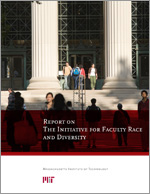Introduction
One of the great challenges faced by U.S. institutions of higher learning in the 21st century, particularly in fields of science and technology, is the engagement and full utilization of the population's talent. MIT has elected to take on this important task of addressing diversity at its highest levels, amongst its own faculty. In order to take significant steps forward in this effort across the Institute, it is critical to understand the issues that must be faced to attain a more diverse faculty.
To this end, the Initiative for Faculty Race and Diversity was charged by Provost L. Rafael Reif to investigate the status of underrepresented minority faculty (which includes Black, Hispanic and Native American faculty) at MIT and to use the findings from this investigation to inform a set of recommendations. The recommendations address Institute policy and practices, with the aspiration that their implementation will increase the recruitment and retention of underrepresented minority faculty. On a broader scale, it is also hoped that these findings and recommendations will guide policy both at MIT and at its peer academic institutions, and will inspire action across the nation to address this critical issue.
To arrive at its findings, the work of the Initiative included an in-depth study of the experiences of minority faculty on campus, with survey and quantitative personnel data, a cohort analysis, and in-depth interviews of minority faculty at MIT. (Detailed results of the research study are included in the Research Report - Part II of this document.) Faculty and other members of the MIT community are greatly encouraged to read the Research Report, which more completely details many aspects of the MIT minority faculty experience, and indicates areas and issues of significance that suggest frameworks for helpful discussions.
This Executive Report provides a brief background and motivation for this work and describes the definitions of underrepresented minority groups that are used at MIT. It also summarizes the activities of the Initiative's effort (Sections A through C); presents a summary of the major findings of the research study (Section D); and provides the recommendations of the Initiative (Section E) that were informed by these research results. Specific issues addressed in the recommendations include faculty recruiting, mentoring, promotion and tenure, as well as structural recommendations that address support and accountability for diversity efforts. These efforts range from the improvement of the graduate student and postdoctoral pipeline to the setting of strategic goals for increasing the numbers of minority faculty at the Institute. In the interest of learning from past and ongoing efforts, several interesting models of success within MIT's own departments and schools - and at other institutions - are highlighted throughout the recommendations section, and these examples are further detailed in Section G. A more comprehensive description of the efforts each School has implemented in addressing diversity are detailed in Appendix C, which is a summary of the Initiative Committee discussions with the academic deans.
Finally, plans regarding implementation of the recommendations and for long-term assessment of MIT's progress with respect to faculty diversity and underrepresented minorities are addressed in Section F. These include discussions about the recommendations among the general faculty, deans and department heads at each of the School Councils, as well as additional discussion with the associate provosts for faculty equity and other faculty leaders. The goal of these discussions will be to determine how to best translate these recommendations into departmental, school and Institute policy.
Next:
A. Background, Mission and
Objectives of Initiative

